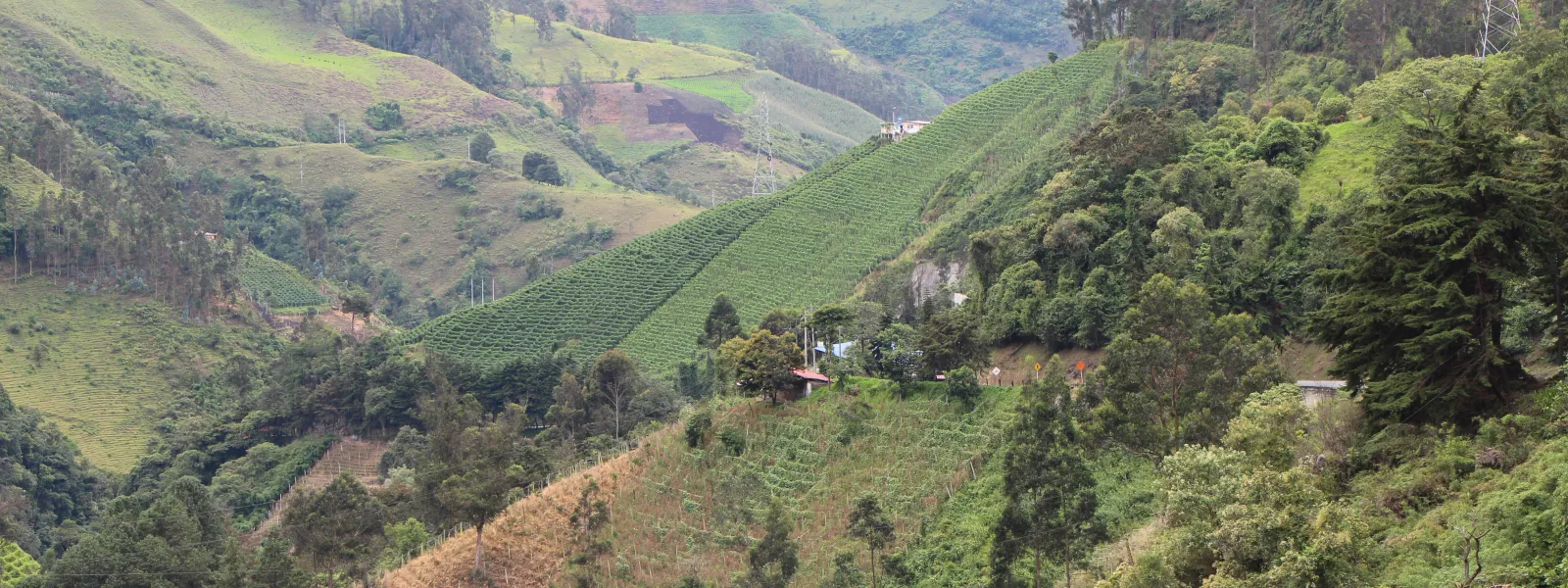
Project
Photo: Andrés Ángel / AIDASupporting Cajamarca’s fight to defend its territory from mining
Cajamarca is a town in the mountains of central Colombia, often referred to as "Colombia’s pantry” due to its great agricultural production. In addition to fertile lands, fed by rivers and 161 freshwater springs, the municipality features panoramic views of gorges and cloud forests. The main economic activities of its population—agriculture and tourism—depend on the health of these natural environments.
The fertile lands of Cajamarca are also rich in minerals, for which AngloGold Ashanti has descended on the region. The international mining conglomerate seeks to develop one of the world’s largest open-pit gold mines in the area. Open-pit mining is particularly damaging to the environment as extracting the metal involves razing green areas and generating huge amounts of potentially toxic waste
The project, appropriately named La Colosa, would be the second largest of its kind in Latin America and the first open-pit gold mine in Colombia. The toxic elements that an operation of that magnitude would leave behind could contaminate the soil, air, rivers and groundwater.
In addition, storms, earthquakes, or simple design errors could easily cause the dams storing the toxic mining waste to rupture. The collapse of similar tailings dams in Peru and Brazil in recent years has caused catastrophic social and environmental consequences.
On March 26, 2017, in a popular referendum, 98 percent of the voters of Cajamarca said “No” to mining in their territory, effectively rejecting the La Colosa project. AIDA is proud to have contributed to that initiative. But even with this promising citizen-led victory, much work remains.
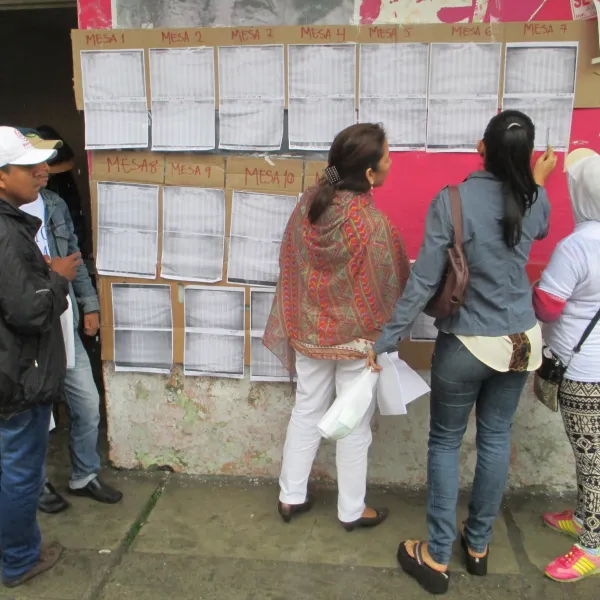
Related projects
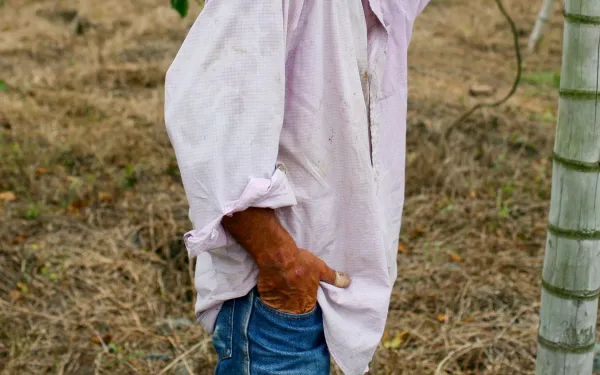
"Defenders prevent us from entering into a situation of no return"
If you’re seeking to improve air quality in your city or working to halt a project that poses risks to the people and environment in your community, you are an environmental defender, although you probably haven't thought of it that way. Defenders are on the front lines of the battle to protect the environment and human rights, challenging public and private interests. Many of them face great difficulties in doing so, suffering from serious rights violations like persecution, threats, the use of public force, legal sanctions and even assassination. According to Global Witness’ most recent report, 212 murders of environmental and territorial defenders were recorded in 2019. Latin America was the most affected region, with Colombia leading the list with 64 murders. Despite the fact that States have the obligation to protect, respect and guarantee the rights of those who defend the environment, violence against them is worsening. On April 22, Earth Day, the Escazú Agreement came into force. It is the first environmental treaty in Latin America and the Caribbean that values the work of environmental defenders and obliges States to protect them and punish actions that violate their rights. Marcella Ribeiro, a Brazilian attorney with AIDA's Human Rights and Environment Program discusses the reality of those who defend the environment in Latin America, and the leading role that governments should play in protecting them. What is the current situation of environmental defenders worldwide and particularly in Latin America? We are going through a moment of extreme vulnerability. At the beginning of the pandemic, and particularly in the countries that are home to the Amazon, media covered shifted to focus only on news related to COVID-19. In this context, defenders were increasingly threatened and some were even killed without any public repercussions. In what way did the pandemic exacerbate their vulnerability? I am going to speak from the perspective of Brazil, where I am located. Environmental human rights defenders have had to defend themselves against both the state and companies that seek to enter their territories and implement a vision of development that is not in line with the vision of the communities themselves. Why is it important to protect the people who defend the environment? Because they are the first force there is for the defense of territory, nature and human rights, not from an individual perspective, but from a collective one. What they do is protect all of us, our rights, our air and our water, even our food security. Defenders prevent our planet from entering into a situation of no return: once the forest is cut down or the river is polluted, there will be no way to recover those ecosystems. With the entry into force of the Escazú Agreement, how does the situation of these people change and how can they be guaranteed access to justice? The Escazú Agreement is the first international legal framework focused entirely on defenders that seeks to ensure that justice and guarantee their rights. Not all Latin American countries have ratified it. This agreement complements and supports efforts to protect them, but for it to be effective we need countries to truly integrate these responsibilities into their national systems so that defenders can use it to their advantage. Political will is vital to protect those who defend the environment, how do you assess progress in this regard? It is evident that environmental defenders in Latin America are being increasingly threatened, even murdered. As this issue gains visibility, I believe that we are seeing a change and an increase in concern from States, even if it is not entirely genuine. While it is difficult to believe in the political, autonomous and altruistic will of Latin American governments, I do believe that the visibility achieved by the Inter-American Human Rights System, the United Nations and NGOs working to document and link the motivations behind these murders gives us a collective strength. Megaprojects should be implemented with a human rights-based development, but what happens when a State opposes the will of people or communities to reject them? Often in Latin America, States decide that a project is going to be implemented regardless of community resistance, or environmental risks related to the project. That is not connected to development, but to corruption. Promoting projects that we know are going negatively impact thousands of people is directly connection to corruption. We need stronger links between those of us working on human rights and environmental issues and those investigating corruption, in order to try to break those links before they are implemented. Given their work for the common good of all humanity and the increasing violence defenders face, AIDA has developed a guide that explains the obligations States have regarding the protection of environmental defenders. Read more here!
Read more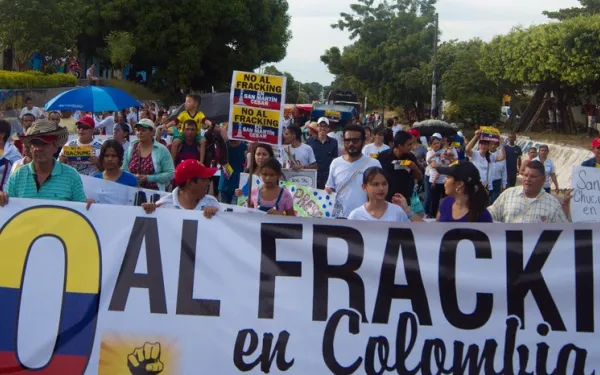
International pressure to stop the advance of fracking in Colombia
Many Latin American governments continue to promote extractive activities—including the exploration and exploitation of unconventional hydrocarbons through fracking, or hydraulic fracturing—as a means of economic revitalization in the face of the crisis caused by the COVID-19 pandemic. This trend contradicts the international commitments adopted by these countries to reduce emissions and mitigate the global climate crisis. A United Nations report, to be released this month, is expected to state that reducing methane emissions will be critical to avoid the most extreme effects of global warming. The report is based on recent data showing that carbon dioxide and methane levels in the atmosphere reached record highs last year, despite the pandemic bringing much of the global economy to a halt. This information complements scientific evidence that methane emissions from oil and gas production—one of its major human-related sources—may be higher than previous estimates. This increase has been associated with the leakage and flaring of methane from fracking operations. Although methane is an extremely potent greenhouse gas, it has a relatively short life cycle in the atmosphere, meaning that reducing its emissions could help the world meet our climate goals more quickly. Colombia is an example of how the push for fracking contradicts the urgent need to combat the climate crisis and its damages. Although it is not legal to carry out fracking operations in the country because its regulation is temporarily suspended, the government has not stopped the development of pilot projects of this technique and continues to anchor its energy policy on hydrocarbons. At the same time, there is a national and international push to stop the advance of fracking in Colombia. While the Council of State makes a final decision on the regulation, two legislative initiatives are underway: one that seeks to prohibit the implementation of fracking nationwide, and another that would prohibit the exploration and/or exploitation of unconventional hydrocarbons by any technique. In the framework of the parliamentary treatment of both bills, which are expected to be unified, authorities from the United Nations and the Inter-American Commission on Human Rights (IACHR) participated in public hearings, in which they called on Congress to approve the legislation that would allow Colombia to move toward a fair and low-emission energy transition. The case for protecting people and the climate In his intervention, David Boyd, UN Special Rapporteur on human rights and the environment, referred to the climate crisis as "serious and unprecedented", highlighting that its impacts on human rights "disproportionately affect poor, vulnerable and marginalized people." In the same vein, Marcos Orellana, UN Special Rapporteur on Toxic Substances and Human Rights, expressed concern about "the Colombian State's intention to consider funding and supporting fossil fuel fracking," considering its potential impact on human rights and sustainability. He emphasized, "new investments in fracking are incompatible with the protection of human rights." For his part, Renato Zerbini, chairman of the Committee on Economic, Social and Cultural Rights—a body, composed of 18 independent experts, that monitors the implementation of the International Covenant on Economic, Social and Cultural Rights by its State parties—stressed that hydraulic fracturing "is closely related to multiple and ongoing human rights violations, as it causes irreversible environmental impacts and severe social affectations." Thus, the use of the technique violates the rights guaranteed by the Covenant, to which Colombia is a party, Zerbini pointed out. In general, the extractive industry "increases the risk for environmental defenders, territorial occupation and the impact on the rights of the communities surrounding the projects," added Soledad García Muñoz, the IACHR’s Special Rapporteur on Economic, Social, Cultural and Environmental Rights. In sum, the representatives of the international organizations reported on the unfeasibility of fracking in climatic, social and even economic terms: "When the real costs of fracking are taken into account, it becomes evident that these far exceed the alleged economic gains," emphasized Orellana. They referred to the international obligations of the Colombian State in terms of human rights and climate change, contained in various instruments. Among those, they cited Advisory Opinion 23/17 on human rights and environment of the Inter-American Court of Human Rights; General Comment 36 on the right to life, contemplated in the International Covenant on Civil and Political Rights; as well as the Joint Declaration on Human Rights and Climate Change that five human rights bodies issued in 2019. The statement expresses that "failure to take measures to prevent foreseeable harm to human rights caused by climate change, or to regulate activities that contribute to such harm, could constitute a violation of States' human rights obligations." The common recommendation: ban fracking At the conclusion of their interventions, the international authorities expressed their support for a law banning fracking throughout the Colombian national territory: David Boyd argued,"to address the climate crisis, Colombia must urgently pursue a low-carbon, climate-resilient future, replacing fossil fuels with renewable energy in light of its obligations under constitutional law, international human rights law and the right to a healthy environment." He concluded, "the government of Colombia must pass a law to ban fracking." Marcos Orellana pointed out that "the Congress of the Republic of Colombia has the opportunity to raise its gaze towards the future and preserve the legacy of its megabiodiversity." In that sense, he pointed out, "the protection of the right to live in a toxic-free environment inspires my respectful call for Congress to adopt a law banning fracking." Soledad Muñoz said that "the approval of a bill whose purpose would be to put an end to the exploration and exploitation of unconventional oilfields, prohibiting practices such as fracking, would represent a valuable measure of environmental protection, the reduction of socio-environmental conflicts and compliance with the commitments emanating from the Paris Agreement and the Inter-American (Human Rights) System itself." Continuing to base local economies on the extractive industry and promoting fracking only increases the dependence of our societies on fossil fuels, deepening the causes of the climate crisis and the damage it does to the most vulnerable among us.
Read more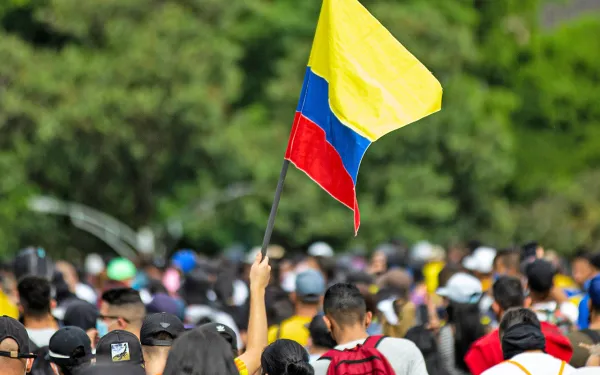
Statement on the abuses of security forces during the repression of social protest in Colombia
In the last week, protests in Colombia over a proposed tax reform have spurred a national mobilization against poverty and inequality, to which the Colombian government has reacted with repression, extreme violence and assassinations. The Interamerican Association for Environmental Defense (AIDA) emphatically rejects the abuses of security forces and expresses our deep concern about the lack of guarantees for social protest in Colombia. According to reports from national and international organizations, in recent days dozens of people have lost their lives in the context of state repression and hundreds more have been injured. We categorically condemn the extreme use of force against demonstrators and demand that the lives and rights of all citizens be respected. Liliana Ávila, AIDA human rights attorney and Colombian citizen, states: "Faced with the worrying escalation of violence, and the abuse of public force to silence social demonstrations, it is urgent that the Colombian state respect the human rights of protesters and create democratic and participatory spaces in which effective responses can be given to the conditions of poverty, marginalization and exclusion that are at the root of these protests." "All people have the right to demonstrate, and it is the State’s responsibility to create effective mechanisms for public participation. It’s extremely worrying that the State, instead, has taken repressive measures incompatible with the rule of law, severely restricting people's freedoms, and violating their right to life and personal integrity, while promoting language that stigmatizes and criminalizes protesters". We call on the international community and urge the Inter-American Commission on Human Rights to demand that the Colombian State respect the human rights of the protesters.
Read more